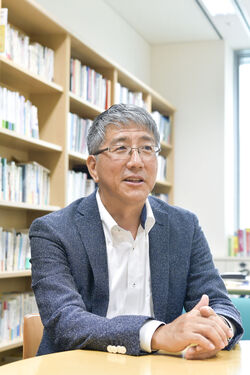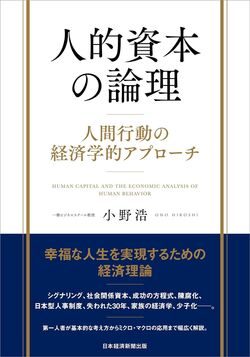Professor Hiroshi Ono | "Human Capital and the Economic Analysis of Human Behavior" published in Japanese
 Hitotsubashi ICS is excited to share the news of the Japanese publication of Prof. Hiroshi Ono's book "Human Capital and the Economic Analysis of Human Behavior". This book explores economic theory of human capital and its applications in diverse spheres of daily life, spanning education, labor, marriage and family, and even macro phenomena such as the socio-economic implications of the "lost 30 years" referring to prolonged stagnation and declining birth rates.
Hitotsubashi ICS is excited to share the news of the Japanese publication of Prof. Hiroshi Ono's book "Human Capital and the Economic Analysis of Human Behavior". This book explores economic theory of human capital and its applications in diverse spheres of daily life, spanning education, labor, marriage and family, and even macro phenomena such as the socio-economic implications of the "lost 30 years" referring to prolonged stagnation and declining birth rates.
Prof. Ono shared his vision and preconditions which led to writing his book.
"So, why did I write it? Well, during my career, I've noticed that most people, when they hear the phrase "human capital," whether it be in English or in Japanese, react as if it's some advanced theory in economics that is hard to grasp. But it isn't. Human capital is the ability, knowledge and productive capacity of individuals. It is the idea that we can grow and become more productive when we invest in human capital. It relates to all of us because human capital is about human beings.
The idea for writing a book on human capital is one I've always had in mind. My research and teaching are anchored in human capital theory, and I am very passionate about this theory - but I also realize that most people don't relate to it because the majority of books on it are written for academics. Also, lately the phrase "human capital management" 人的資本経営 is in the news, almost every day. There is a lot of confusion around this idea because quite often the concept of human capital is misused. There are now dozens of books written about human capital management, but virtually nothing about human capital itself. This became the source of motivation for me, to write a book on human capital that would make the theory accessible to a general audience, to anyone with an intellectual curiosity".
The book is available at major bookstores and online retailers such as Amazon and Kinokuniya.
Here is an excerpt from the book cover in English and in Japanese (original).
人的資本とは、人間の持つ能力、才能、知識、体力を指す。人的資本理論は、それらに投資することで能力が伸び、成長すると考える、単純明快かつ深みのある理論である。その思想は18世紀までさかのぼるが、20世紀後半から、ノーベル経済学者ゲーリー・ベッカーを中心に理論と実証研究が急速に発展した。教育、報酬、差別、結婚、出産など、ミクロからマクロの現象まで幅広く説明ができる理論として、社会の様々な場面で応用されている。しかし、人的資本理論が社会に与えるインパクトは、世の人々に十分に知られているとは言いがたい。それはひとえに、専門家以外の人に対する解説が不足していたからにほかならない。本書はベッカーの弟子による、人的資本理論を体系的に理解するための、待望の入門書である。学歴社会、日本型人事制度、失われた30年など、日本社会の事例も多く取り入れて、可能な限り分かりやすく解説する。
Human capital refers to the abilities, talents, knowledge, and physical capacity of individuals. The theory assumes that investing in human capital increases our productive capacity. The idea dates back to the 18th century, but there were significant advances in the 20th century in theory and empirical research, led by Nobel Economist Gary Becker. The theory can explain a wide range of micro and macro phenomena such as education, compensation, discrimination, marriage, and childbirth. However, the impact of human capital theory on society is not generally well known. This is due, in part, to the lack of explanations for non-specialists. This book is a long-awaited introduction to human capital that provides a systematic understanding of the theory, written by a scholar who learned directly under Gary Becker. The book explains the theory in a non-technical way and includes many examples from Japanese society, such as educational credentialism, the Japanese employment system, and the lost 30 years.








